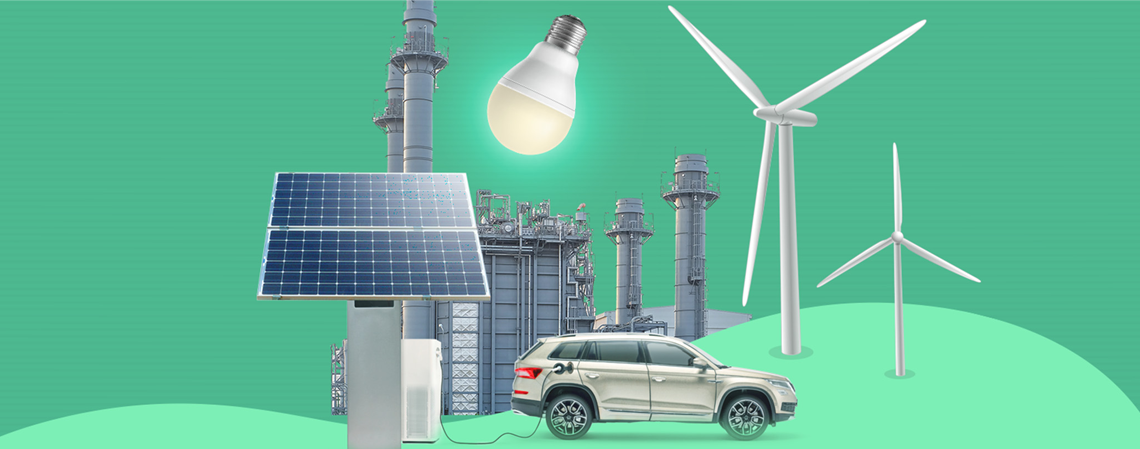Don’t stop here
There’s much more to discover!

"Smart energy." The literal translation of "smart energy" is as simple as it is meaningful, as this definition implies new models of energy production and consumption—a transformation already underway that is reshaping our present. For example, our homes are beginning to use and measure energy more consciously, thanks to smart metering tools. Increasingly, consumers are evolving into "prosumers", capable of producing, storing and sharing their own electricity with the grid.
When a growing number of citizens, businesses, public administrations, and companies join forces to produce, exchange, and consume energy from locally sourced renewable resources, cities become more "smart" through innovative energy management models, such as energy communities. Mobility, shifting toward electric solutions, also plays a significant role, impacting how we move and consume energy. This shift marks a paradigm change that not only optimizes consumption but also contributes to an equitable and future-proof energy transition.
According to the IoT Observatory of the Politecnico di Milano, smart energy represents the effective integration of Internet of Things (IoT) principles into the energy sector.
"Smart energy involves the integration and coordination of all applications, solutions, and projects for energy management, which enable a real improvement in the energy efficiency of homes, buildings, and facilities. Moreover, smart energy aims to optimize comfort levels for occupants within smart spaces," explains the IoT Observatory.
Smart energy is an energy system based on three key pillars: digitization, integration, and active consumer participation. Digitization, enabled by intelligent, interconnected technologies, allows for continuous monitoring of energy flows, optimizing production and distribution in real time. Integration, on the other hand, enables the combination of different energy sources, primarily renewable ones, in a flexible and resilient system. Finally, there’s the active role of the consumer who, by monitoring their own consumption, can adopt virtuous behaviors aimed at energy savings or, by becoming a prosumer, actively participate in electricity production through systems that generate renewable energy, such as solar panels.
Smart energy is not an abstract concept but a tangible approach to energy that can affect all levels of our daily lives. A clear example is the smart home, where home automation and IoT turn a house into an intelligent, connected environment. Remote control of lights and appliances, or scheduling the heating to turn on shortly before returning home, is now within reach via smartphone. Similarly, we can monitor household consumption thanks to smart metering systems, which use intelligent meters to measure energy use and send the data to our device. Plenitude's gateway, an integrable and scalable example, allows users to manage home energy aspects simply and intuitively, from tracking consumption to integrating data on energy produced by photovoltaic panels and stored in storage systems, and even remote control via an app.
But smart energy goes well beyond the home. Aggregated data from thousands of users enable smart grids—intelligent electrical networks—to optimize energy distribution based on actual demand, reducing waste and the risk of blackouts. Using sensors and advanced communication systems, smart grids can match energy demand to actual production, integrating renewable sources like wind and solar power.
Looking beyond individual homes to cities, we encounter smart cities, where smart energy translates into, for example, streetlights that adjust brightness based on the presence of pedestrians or vehicles, widely distributed charging systems for electric vehicles, and smart traffic management to reduce emissions. We can envision entire neighborhoods—so-called smart districts—becoming micro-energy networks, producing and sharing renewable energy.
In this scenario, digitization is a crucial enabling factor: sensors, smart meters, and software make it possible to collect and analyze vast amounts of data, creating an interconnected and efficient energy system. This system is also bidirectional, in which producers and consumers actively interact to maximize efficiency and minimize waste. This intelligent network can predict demand, adjust it in real time, and integrate multiple energy sources.
In this context, Plenitude positions itself as an operator capable of supporting all types of users (private and business) by providing innovative and personalized tools to enhance energy efficiency in homes, businesses, and cities.
As Albert Einstein once said: "I never worry about the future. It comes soon enough". And the future of energy is already here.
There’s much more to discover!
From managing bidirectional flows to integrating renewables, smart grids are the essential infrastructure for energy efficiency, energy communities and smart districts.
There are different types of digital fraud that often exploit users' good faith. Protecting yourself is possible: here are some tips.
Cloud, AI and automation at the core of Plenitude's digital transformation to improve efficiency and customer experience.